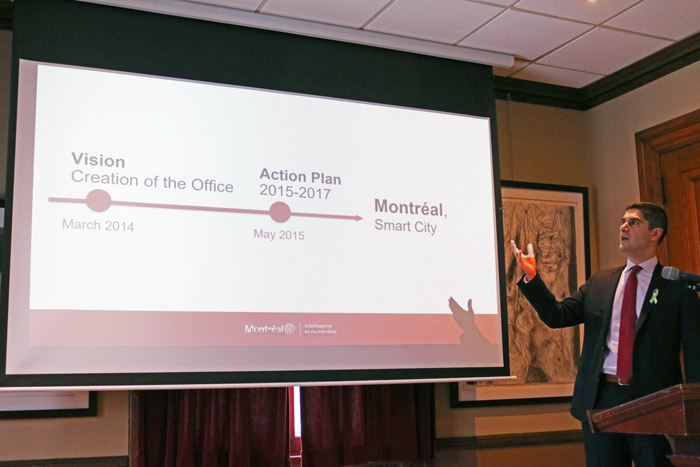On Feb. 15, the Quartier de l’Innovation Students’ Society (QISS) hosted Montreal City Councillor Harout Chitilian as part of their Innovation Seminar Series. Chitilian discussed Montreal’s Smart and Digital City Initiative, which he is currently spearheading.
The smart city initiative aims to integrate advanced technologies into as many spheres of civic management as possible in order to improve Montreal’s mobility, connectivity, and productivity. The City of Montreal, one of the leaders in the global Smart City movement, began this undertaking in March 2014 and spent a year developing a detailed action plan.
“We start with the intent […],” Chitilian said. “Ours was to become one of the world’s smartest cities.”
Chitilian outlined the five building blocks of the plan—Data, Connectivity, Mobility, Collaboration and Innovation—while emphasizing how he envisions the Smart City will serve its citizens.
“To be a Smart City is not to be the most technological city,” Chitilian said. “It’s to be a city that puts humans first, that puts openness and transparency first, that puts quality and services first, and uses technology for that end.”
Specific goals that the Smart City team is currently working towards includes publicizing 800 municipal government-related data sets (for example, citizen travel patterns) by 2018. The Smart City team ultimately seeks to bridge the gap between the municipal government and its constituents through various digital services.
Public and private partnerships with the city hope to streamline mobility within the city as well as to integrate all transit, traffic, parking, BIXI, and car sharing management. One such partnership is with the Waze traffic and navigation app.
Montreal’s Smart City project focuses on fostering innovation by helping to finance start-ups and developing several outreach programs to accelerate smart ideas, in line with the vision of the Quartier de l’Innovation’s (QI) Innovation Seminar series.
Jacob Lavigne, the organizer of the Innovation Seminar Series and External Affairs Officer of the Post-Graduate Students’ Society (PGSS), explained that the event raised awareness for the opportunities that the QI offers to young entrepreneurs. QI is an organization intent on promoting innovation.
“McGill is in the [QI] as a partner,” Lavigne said. “[The university has] invested time and [resources] into [QI], yet students don’t know about it [….]”
Christian Gilroy, U2 Civil Engineering, said that the event assured him of the professional opportunities available to him after graduation.
“It’s definitely nice to hear that there’s a market for this, that the City of Montreal is even investing in these things, and that big companies are interested in coming to Montreal for these reasons,” Gilroy said.
Both Lavigne and Chitilian emphasized that undertakings such as the Smart City and the QI intend to emphasize that individuals have the ability to make an impact on their city.
Chitilian commenced his presentation by explaining the role of citizens in helping Montreal to become a Smart City.
“[The Smart City Initiative] is not for me, we want to work with you, for you,” Chitilian said. “So there needs to be a continuity of that. The project has to be sustainable. For it to be sustainable, […] we need people to get involved and drive these agendas.”
Lavigne echoed Chitilian’s sentiments, underlining students’ contributions to the Smart City project.
“[The Smart City initiative and the QI] value students and there’s so many opportunities out there,” Lavigne said. “They want you [students]. You are the motor, you are what runs the city and this argument that ‘I’m only one person,’ [is not sufficient]. No, you can do something with high impact [….] That’s really what I want to come out of [The Innovation Seminar series].”








